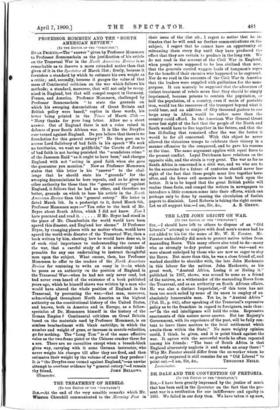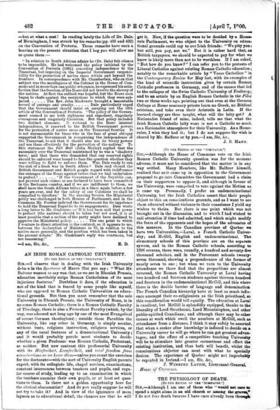DR. DALE AND THE CONVENTION OF PRETORIA. [TO THE EDITOR
OF THE "SPECTATOR.") SIR,—I have been greatly impressed by the justice of much that has been said in the Spectator on the fact that the pre- sent war is a retribution for our indifference and apathy in 1881. We failed in our duty then. We have taken it up now,
—but at what a cost ! In reading lately the Life of Dr. Dale. of Birmingham, I was struck by his remarks (pp. 438 and 482) on the Convention of Pretoria. These remarks have such a bearing on the present situation that I beg you will allow me to quote them!—
" In relation to South African affairs he (Dr. Dale) felt silence to be impossible. He had welcomed the policy initiated by the Convention of Pretoria (1881) conceding independence to the Transvaal, but imposing on the Imperial Government responsi- bility for the protection of native races within and beyond the frontiers. In correspondence with Mr. Chamberlain, who on that subject was the. mouthpiece of the Cabinet in the House of Com- mons and in more than one public utterance, he expressed his satis- faction that the freedom of the Boers did not involve the slavery of the natives. At first the outlook was hopeful, but the Boers soon began to chafe against the restrictions to which they were sub-
jected The Rev. John Mackenzie brought a lamentable record of outrage and cruelty Dale particularly urged
that the Government should insist on carrying out the 18th article of the Convention of Pretoria. The policy of the Govern- ment seemed to me both righteous and expedient, singularly courageous and singularly Christian. But that policy included two distinct elements. It restored to the. Boers internal independence, it reserved to the British Government powers for the protection of native races on the Transvaal frontier. It is not unreasonable for those who in the face of great obloquy supported the Government in recognising the independence of the Transvaal, to ask that it should also use its treaty powers and use them effectively for the protection of the natives.' To this statement the Pall Mall (John Morley) replied that the suzerainty over the Transvaal maintained by us was a ' shadowy term,' and that those who demanded that our reserved rights should be enforced were bound to face the question whether they were willing to fight to enforce them. Was Dale ready to run the risk of a fresh war in South Africa ? Dale said should the British Government and British people regard with indifference the outrages of the Boers against tribes that we had undertaken to protect? .... . If the Government of the Rereiblic can- not prevent such crimes as are declared to have ba,n committed in the Bechuana country, and if we are indifferent to them, we shall have the South African tribes in a blaze again before a few years are over, and for the safety of our Colonists we shall be compelled to interfere.' In the ensuing Session the Ministerial policy was challenged in both Houses of Parliament, and in the Commons Mr. Forster indicted the Government for its impotence to hold the Transvaal Republic to its engagements. Dale wrote
a long letter to Mr. Gladstone If it had been said that power to protect (the natives) should he taken but not used, it is at least possible that a section of the party might have declined to approve the Ministerial policy The one point to which I venture to direct attention is the contrast, as it appears to me, between the declaration of Ministers in '81, in relation to the native races generally, and the position which has been taken in the present debate.' Mr. Gladstone's reply was courteous, but not reassuring."







































 Previous page
Previous page